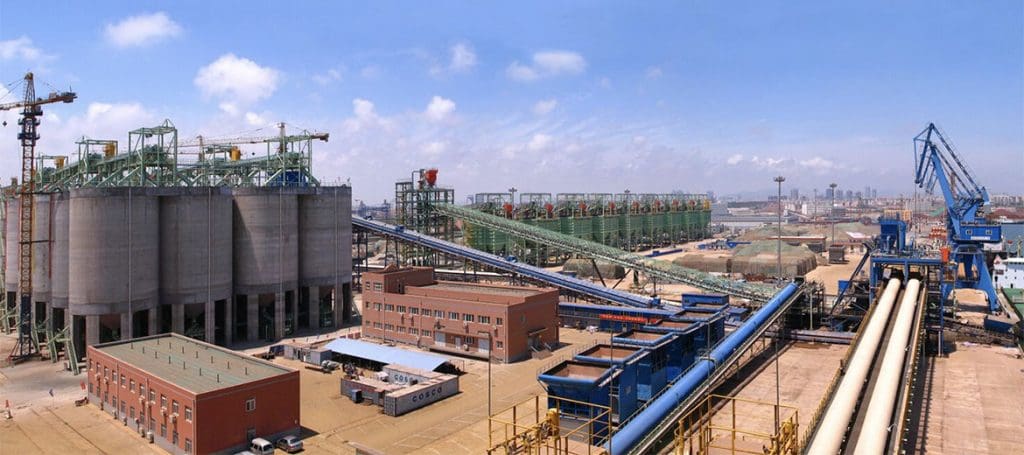
Jurong Port in Shandong Province is one of the country’s entry points for imported grain. Photo: Jurong Port
A REPORT by ITS Global shows uncertainty from ongoing bilateral trade wars between China and the United States have set the global trading environment back decades and undermined Australian agricultural exports.
Entitled Bilateral Trade Wars: Understanding the implications for Australian agriculture, and released this week, the report was funded by AgriFutures Australia.
“This robust analysis gives Australian exporters the knowledge they need to take a leadership role in attempting to restore stability for agricultural commodities in the current global trading environment,” AgriFutures Australia managing director John Harvey said.
Wheat
When looking at agricultural exports by commodity, the report has pointed to the US-China trade stoush as being largely neutral to beneficial, with Australian wheat exports being likely to be impacted positively in the near term.
This is because US access to China’s grain market is currently restricted.
However, settlement of the broader trade dispute between the US and China could reopen or expand this market for US exports.
Cotton and wool
Australian cotton exports are also expected to benefit from the temporary advantage offered by China’s tariffs on US exports.
In 2017, the US was China’s top source of cotton imports, followed by Australia.
AgriFutures Australia senior manager business development Jen Medway said the US-China trade wars may not have a noticeable impact on the Australian wool industry, despite China implementing retaliatory tariffs on some US wool products.
“The relatively small size of the US wool-export market to Asia will buffer any significant uncertainty for Australian wool exporters as a result of the increased tariffs,” Ms Medway said.
Australia’s wool exports to China are not directly impacted by the bilateral trade wars.
US tariffs on Chinese yarn exports could impact negatively on Chinese demand for Australian wool.
However, the report said the impact was likely to be small, as there have not yet been additional tariffs applied to other end uses for Australian wool, including apparel.
Meat
The report says the outlook for Australian sheep and goat meat exports, primarily lamb, as a result of the US-China trade wars is expected to be minimal.
These products have not been the focus of additional tariff actions, but a US-United Kingdom Free Trade Agreement, following the UK’s exit from the European Union would have a negative impact on some Australian markets.
“The UK is a leading sheepmeat exporter and the US is Australia’s most important market, (so) any improvement in access for UK product into the US would be damaging to Australia’s export interests.”
The report said Australia’s beef exports were likely to be largely unaffected by US and China tariff actions, but a prospective US Free Trade Agreement with Japan has threatened Australia’s currently competitive position in that market.
“The US is increasingly eager to expand its export reach of beef products into Japan, with the US having very limited access to China and the EU due to a ban on hormone growth promotants.
“With the US and Japan edging closer to negotiating a bilateral FTA, Australian beef exports to Japan may suffer.”
Also on beef, US-Brazil trade talks could see Brazil expand its presence in the US market to the disadvantage of Australia.
WTO principles threatened
Mr Harvey said the report’s findings showed that unilateral moves by the Trump Administration to renegotiate existing trade agreements had threatened World Trade Organisation (WTO) principles of a rules-based trading system, creating uncertainty for Australian agriculture.
Ms Medway said while some industries would prosper and others might feel the pressure as a result of these trade wars, understanding the potential impact was fundamental to creating stability in an unsettled trade environment.
“Australia’s dairy industry is one industry that could potentially benefit from trade opportunities with China on the back of additional tariffs imposed on US dairy products.
“On the flip side, a prospective US-Japan FTA could negatively impact the dairy industry as US producers disadvantaged in the Chinese market could gain improved access to Japan.
Mr Harvey said the key message from the research was that trade wars created uncertainty, which was bad for business and leaves agricultural producers, traders and buyers struggling to manage a shifting policy landscape.
“The longer this period of uncertainty lasts, the more commercial decisions will need to be made by Australia’s agricultural stakeholders facing the prospect of sudden and unpredictable policy changes at the global level,” he said.
As a medium-sized, open economy dependent on trade to underpin economic growth, Australia benefits significantly from the confidence and predictability inspired by the smooth operation of the international trade regime.


HAVE YOUR SAY